One day, a concerned citizen contacted an animal rescuer about a distressed puppy suffering from neglect and abuse.
The caller stated that her neighbour, the owner of the puppy, kept him outside and refused to let him into the house, no matter the weather.
As soon as they got the address, the rescuer wasted no time and made their way down to the owner’s house, demanding that they let the poor guy inside.
However, the owner cruelly refused, showing no concern for the puppy’s wellbeing and suggesting that if the rescuer cared so much, they should purchase the puppy and take him away.
Without hesitating, the rescuer agreed and, for a mere $15, had the pup in their loving arms.
Finally Safe
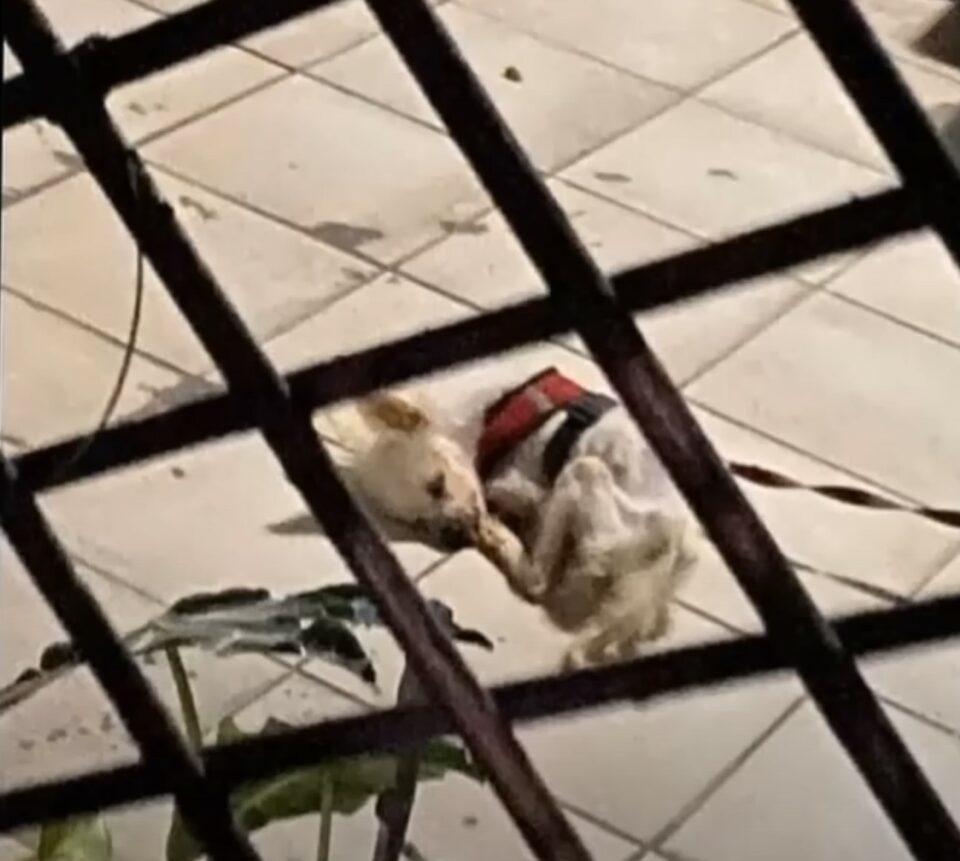
The puppy was in terrible condition.
He was covered in dirt and was so malnourished that his bones were poking through his thin, wounded skin.
The rescuer immediately gave him a bath and, the next day, took him to the vet so that he could get all the necessary shots and medication.
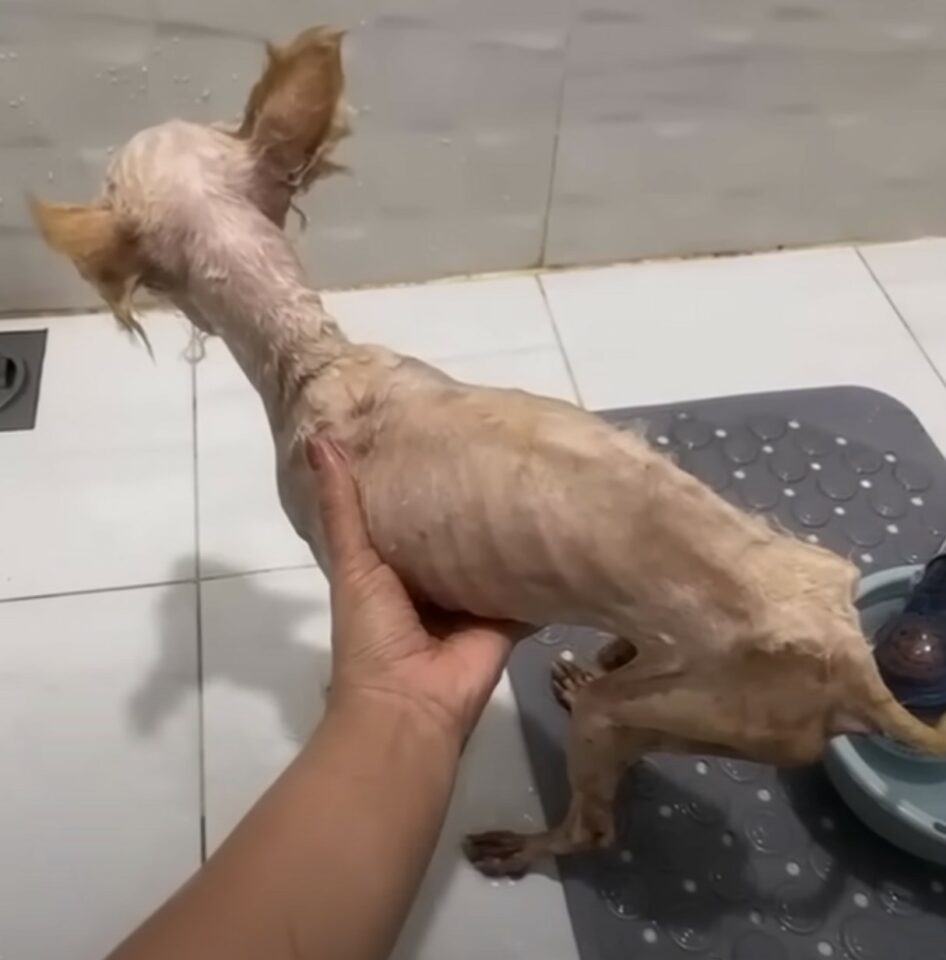
Road To Recovery
It was obvious that the puppy had never been around other dogs and would become very aggressive whenever their paths crossed. It was also very clear that he was never properly trained.
Luckily, he was in very good hands, and all of this was soon going to change.
The puppy, now named Kochi, had no issues adapting to his new environment. It was as if he knew that these hoomans would help him transform into the cutest, sweetest pup ever.
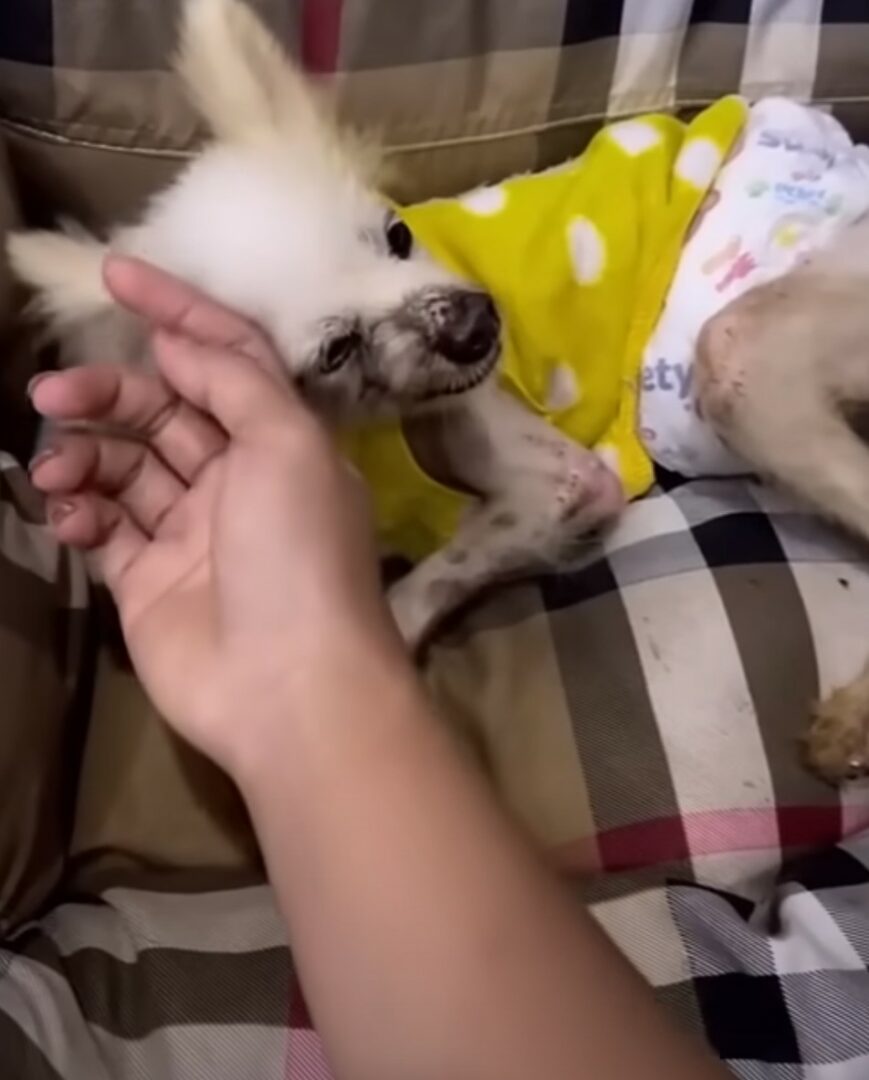
Since Kochi had a lot of skin issues, his rescuer had to be really careful and put medication on them every single day.
Over time, he gained some healthy weight and even started playing with other pups! That is when he met his new best friend, who helped him in his recovery journey.
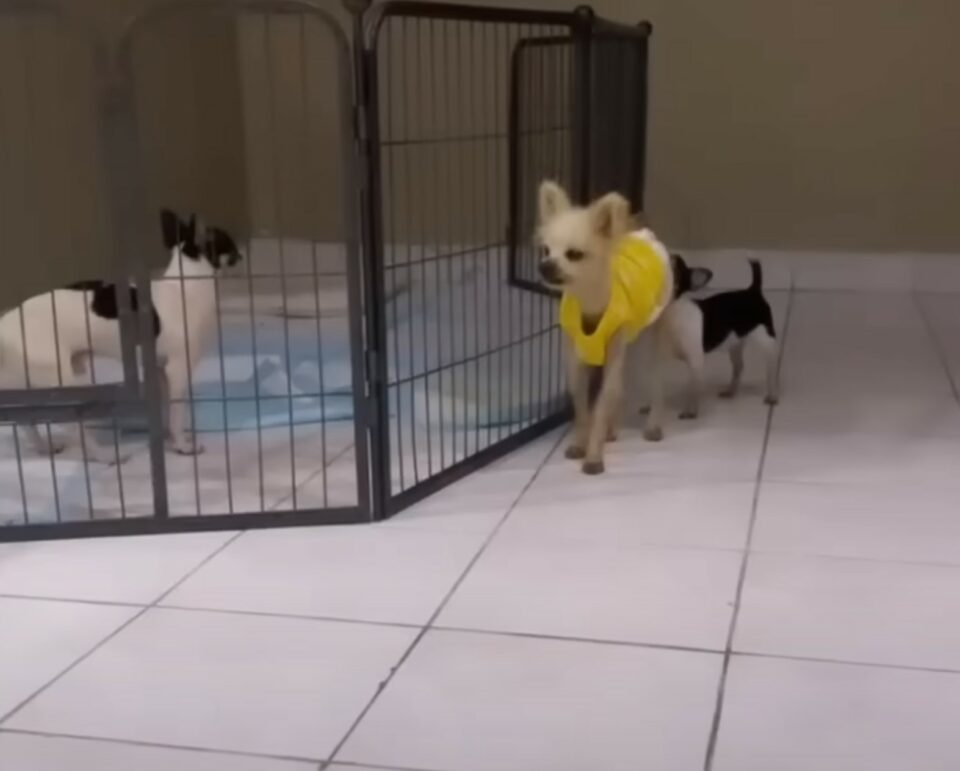
It only took Kochi one week to show incredible progress. His fur started to grow back, and he always had a smile on his face.
Even though he still has a long way to go, I am sure that he will make a full recovery and that he will find loving hoomans that will show him what it feels like to be a part of a loving family!
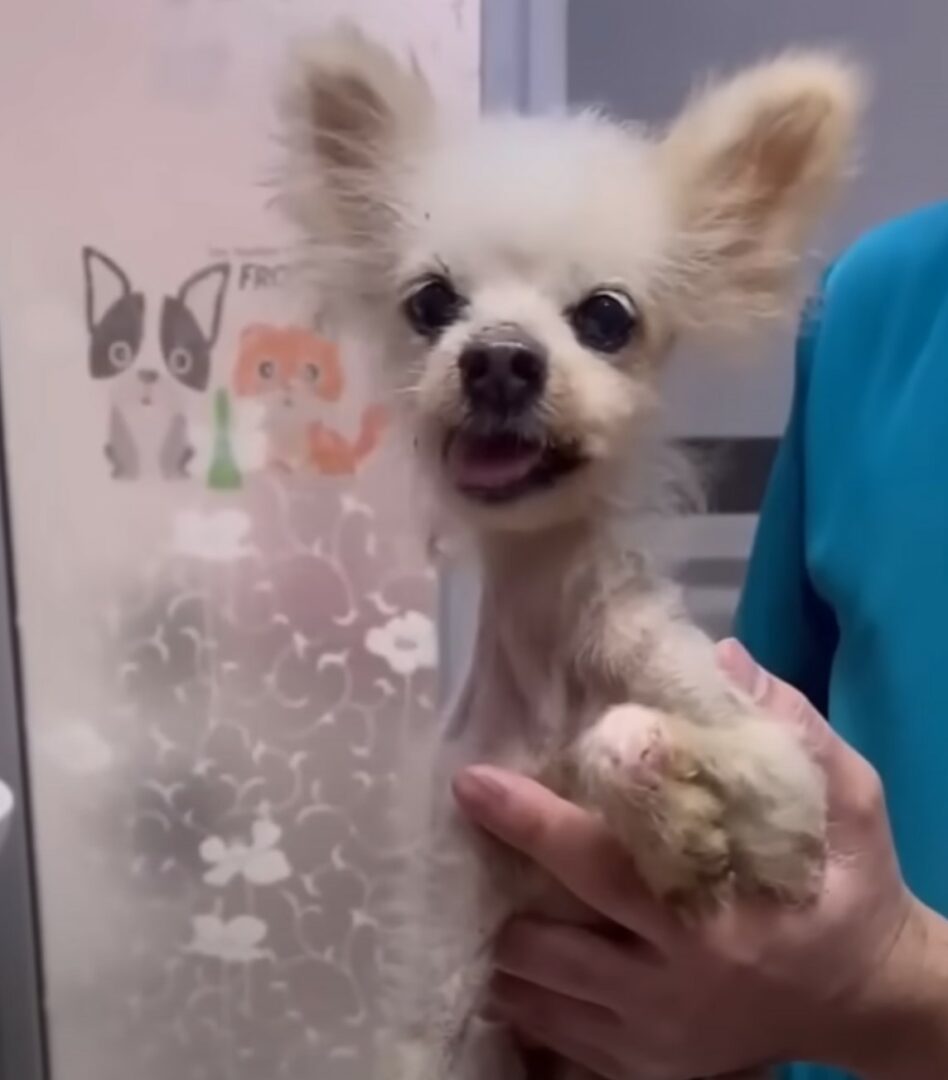
Stop Dog Cruelty
What happened to Kochi is absolutely unacceptable.
Unfortunately, people keep forgetting that doggos have emotions, too, and that treating them so cruelly can have serious consequences.
Pups aren’t just pets – they are cherished members of our society who trust us to care, love, and protect them.
However, when we betray them, it not only causes physical harm but also emotional harm. So please, stand up against any form of cruelty or neglect because only then can we truly create a world where all beings, both human and animal, can live happily and free.
If you’ve ever caught your furry friend munching on dog poop, you’re not alone. It’s a common behavior that can leave you puzzled and slightly grossed out. As a seasoned dog trainer, I’ve encountered this issue countless times, and there are a few reasons why your dogs might be indulging in this not-so-appetizing habit. Understanding the motivations behind this behavior can help you address it effectively and ensure your pup stays healthy and happy.
Dogs eating dog poop, also known as coprophagia, can stem from various factors such as dietary deficiencies, boredom, curiosity, or even seeking attention. While it may seem repulsive to us, dogs have their reasons for engaging in this behavior. By delving into the possible causes, you’ll be better equipped to tackle this issue and guide your canine companion towards more appropriate behaviors.
Understanding Coprophagia in Dogs
The Basics of Coprophagia
Coprophagia, the habit of dogs eating their own feces, can puzzle and concern pet owners. This behavior is more common than many realize and can stem from various reasons such as dietary deficiencies, boredom, or seeking attention. It is essential to understand that coprophagia is a natural behavior in some dogs, but it can still be managed and controlled with the right approach.
Common Misconceptions
There are several misconceptions surrounding coprophagia in dogs. One common belief is that dogs engage in this behavior to spite their owners. However, this is not the case. Dogs do not see feces in the same way humans do, so it’s not a deliberate act to upset you. Another misconception is that coprophagia is always a sign of a medical issue. While this can be true in some cases, it’s not always the primary cause. It’s crucial to address coprophagia through proper training and understanding rather than just assuming it’s a medical concern.
Health Implications of Dogs Eating Feces
The Risks to Your Dog
Eating feces can expose your dog to various health risks. Consuming stool can lead to the ingestion of harmful bacteria, parasites, or even toxins present in the feces. This can result in gastrointestinal issues such as vomiting, diarrhea, and in severe cases, infections that may require veterinary treatment.
When to Consult a Veterinarian
If your dog is regularly eating feces, it is essential to consult a veterinarian. Persistent coprophagia could be a sign of an underlying medical condition that needs professional attention. Additionally, sudden changes in your dog’s behavior or health after consuming feces should prompt a visit to the vet to rule out any potential health concerns. Regular check-ups and open communication with your veterinarian can help ensure your dog’s well-being.
Psychological and Behavioral Factors
Stress-Related Behavior
When dogs experience stress or anxiety, they might engage in coprophagia as a coping mechanism. Stressors like changes in routine, loud noises, or being left alone for long periods can trigger this behavior. If your dog is eating feces due to stress, identifying and addressing the underlying cause can help reduce this habit. Providing a calm and secure environment, ensuring regular exercise, and offering comfort can help alleviate stress-related coprophagia.
Learned Behavior from Other Dogs
Dogs are social animals and can learn behaviors from their canine companions. If a dog observes another dog eating feces, they may imitate this behavior out of curiosity or a desire to mimic their pack members. To prevent this learned behavior, it’s essential to discourage coprophagia in all dogs in the household. Supervising interactions, redirecting attention, and positively reinforcing good behavior can help break the cycle of learned coprophagia among dogs.
The aim is to provide valuable insights into the psychological and behavioral factors influencing coprophagia in dogs. Understanding these aspects can aid in effectively addressing and managing this behavior to ensure your furry companion’s well-being.
Nutritional Deficiencies and Diet
The Role of Diet in Coprophagia
Proper nutrition plays a crucial role in preventing coprophagia in dogs. When a dog doesn’t get all the essential nutrients it needs from its diet, it may be compelled to eat poop to try and satisfy those deficiencies. Ensuring that your dog is on a balanced and complete diet can help curb this behavior.
Supplements and Nutritional Solutions
Sometimes, even with a balanced diet, dogs may still exhibit coprophagia due to specific deficiencies. In such cases, your veterinarian may recommend certain supplements to address these nutritional gaps. Adding supplements like probiotics or specific vitamins to your dog’s diet can help reduce the urge to eat feces. It’s essential to consult with your vet before making any changes to your dog’s diet or introducing supplements to ensure they are safe and appropriate for your furry friend’s needs.
Coprophagia Prevention and Training
Effective Training Techniques
When dealing with coprophagia in your dogs, effective training techniques play a crucial role in curbing this behavior. Here are some key strategies to help address and prevent coprophagia:
- Positive Reinforcement: Use positive reinforcement to reward your dog when they exhibit desirable behavior. Praising and treating your dog when they avoid eating feces can help reinforce this behavior.
- Consistent Commands: Teach your dog commands like “Leave it” or “Drop it” to deter them from eating feces. Practice these commands regularly in different situations to make them more effective.
- Redirect Behavior: Redirect your dog’s attention away from feces by offering them an alternative, such as a favorite toy or engaging in a fun activity. This helps shift their focus from the undesirable behavior.
- Supervision: Keep a close eye on your dog, especially during walks or in the yard, to prevent them from consuming feces. Supervision is key to catching the behavior early and intervening effectively.
Environmental Management and Supervision
In addition to training, environmental management plays a significant role in preventing coprophagia in dogs. Consider the following environmental strategies to help manage this behavior:
- Clean Environment: Ensure your dog’s living area is kept clean and free of feces, reducing the opportunity for them to engage in coprophagia. Regularly clean up the yard and dispose of waste promptly.
- Leash Training: Use a leash to control your dog during walks and prevent them from accessing feces. Leash training can help you steer your dog away from potential sources of feces.
- Limit Access: Restrict your dog’s access to areas where they have a habit of consuming feces. Use baby gates or close doors to prevent them from reaching these spaces unsupervised.
- Interactive Toys: Provide your dog with interactive toys and mental stimulation to keep them engaged and prevent boredom, which can be a trigger for coprophagia.
By combining effective training techniques with proper environmental management and supervision, you can take proactive steps to address and prevent coprophagia in your dogs, promoting their overall well-being and health. Remember, patience and consistency are key when implementing these strategies.
Products to Deter Coprophagia
Over-the-Counter Solutions
When it comes to tackling coprophagia in dogs, over-the-counter solutions can be a convenient option. You can find various products in pet stores or online that are specifically designed to deter dogs from consuming feces. These products usually come in the form of tablets, chews, or additives that are meant to make the feces unappetizing to your furry friend. Some over-the-counter solutions contain ingredients like yucca, parsley, or glutamic acid, which can help in deterring dogs from eating poop. Make sure to follow the instructions provided on the product packaging for effective use.
Home Remedies and Natural Deterrents
If you prefer a more natural approach to discourage coprophagia, there are several home remedies that you can try. For instance, adding a small amount of pineapple or pumpkin to your dog’s diet may alter the taste of the feces and make it less appealing. Another natural deterrent is sprinkling a bit of hot sauce or bitter apple spray on the poop piles to dissuade your dog from consuming them. Additionally, you can try incorporating certain foods like vegetables or fruits that can make the feces less appetizing when excreted. Experiment with these home remedies to find what works best for your dog and helps curb this undesirable behavior.
Personal Experiences and Case Studies
Stories from Dog Owners
You’re not alone in dealing with this behavior. Many dog owners have shared their experiences with dogs eating poop. One owner mentioned that their dog started this habit when feeling anxious, and another found that their dog was copying the behavior of a fellow pet. These stories highlight the diverse reasons behind coprophagia among dogs and how various factors can contribute to this behavior.
Professional Insights
Seeking advice from professionals can shed light on effective strategies for addressing coprophagia. Veterinarians often recommend dietary modifications, increased exercise, and behavior training to tackle this issue. A dog trainer shared that positive reinforcement techniques have helped many dogs overcome this habit. These insights emphasize the importance of understanding the root cause of the behavior and implementing targeted interventions to curb it.
Conclusion
So, there you have it – a deeper look into why your furry friends might be munching on poop. From dietary needs to attention-seeking antics, there’s a range of reasons behind this behavior. Remember, every dog is unique, and what works for one may not work for another. It’s all about finding the right approach that suits your pup. By incorporating proper nutrition, engaging activities, and positive reinforcement, you can help curb this habit. Don’t forget, seeking guidance from professionals can provide valuable insights tailored to your dog’s specific needs. With patience and understanding, you can tackle coprophagia and create a happier, healthier environment for you and your four-legged companions.
Frequently Asked Questions
What causes coprophagia in dogs?
Coprophagia in dogs can be caused by dietary deficiencies, boredom, and attention-seeking behavior.
Why is it important to understand the motivations for intervention?
Understanding motivations for intervention is crucial as coprophagia can stem from stress-related coping mechanisms and learned behaviors.
What are some triggers for coprophagia in dogs?
Common triggers for coprophagia in dogs include stressors and imitation within a household.
How can coprophagia be addressed in dogs?
Coprophagia in dogs can be addressed through proper nutrition, supplements, prevention, and training techniques like positive reinforcement.
What are some recommended strategies for dealing with coprophagia in dogs?
Effective strategies for dealing with coprophagia in dogs include dietary modifications, increased exercise, and behavior training using positive reinforcement.
[no_toc]

Hey there, I’m Janet Brooks, a dog-loving student from California. I’m all about helping pups in need, especially those without homes. Me and my awesome friends work together to give shelter and love to stray dogs. Oh, and I also write blogs about dogs to share helpful info.